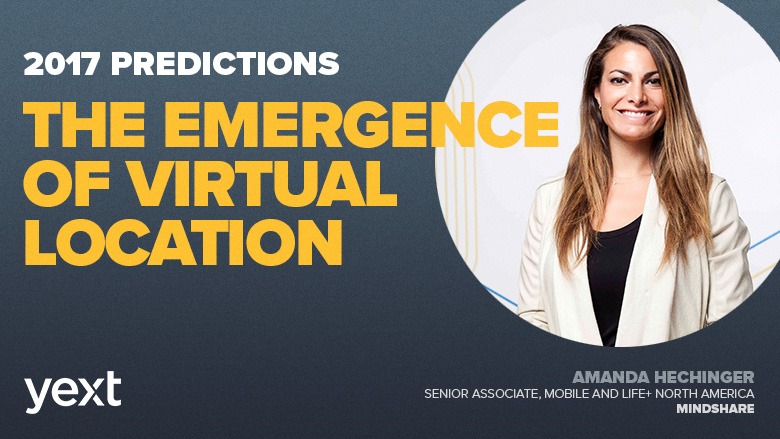Industry Insights
2017 Predictions #15: The Emergence of Virtual Location
To give you a jump start on the new year, we asked industry experts about their predictions for the future of location, marketing, and technology in 2017. We’ll be posting their responses over the next month here on the Yext blog. Follow us on Twitter @Yext for new posts, and tweet at us with your own predictions. […]

Yext
Dec 30, 2016

To give you a jump start on the new year, we asked industry experts about their predictions for the future of location, marketing, and technology in 2017. We'll be posting their responses over the next month here on the Yext blog. Follow us on Twitter @Yext for new posts, and tweet at us with your own predictions.
Amanda Hechinger
Senior Associate, Mobile and Life+ North America, Mindshare
While emerging trends like mixed reality, A.I., and live video had more substantial years by way of generating conversation and publicity, location consistently acted as a fundamental component of these trends. For example: just think about how location powered Pokémon Go, even though the app made greater waves for supporting augmented reality. The fact is, location was the true unsung hero of 2016 – and 2017 holds tons of growth potential for the location space as a whole.
In addition to being a primary constituent of emerging technologies, the intersection of location and commerce will play a substantial role in the following year. It's not where one is, but where one's been that gives brands the best indication of who they are as an individual. Using geo-location, the moments when a person arrives at a store location, or even arrives back home to shop online, are areas where more brands can – and will – deploy experiences to generate positive brand engagement. Because devices turn us into walking versions of web traffic, location will continue to provide advertisers with an acute understanding of which moments (and when) a user is more receptive to engaging with a brand.
Moreover, advancements in location data will help marketers narrow down audience pools to create more hyper-targeted campaigns. But it'll be just as important for location vendors to keep using noninvasive methods of collecting and leveraging location data. The end goal is to always provide contextually relevant content and useful experiences for consumers.
Lastly, more than just physical location, virtual location is a hot topic that's sure to dominate the tech world in 2017. Samsung's Oculus, Google Cardboard, and even our everyday mobile devices via a VR headset now have the capability of transporting us from everyday life into a mixed reality state, ultimately giving brands a unique opportunity to play in this space.
This post is part of a series of 2017 predictions from industry experts.